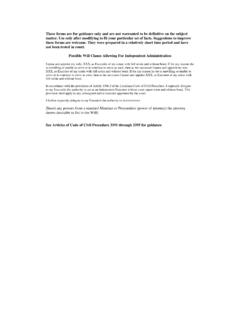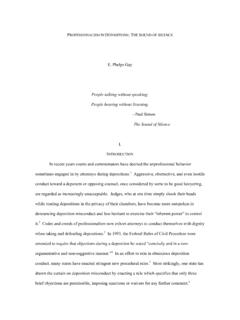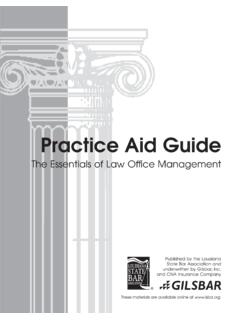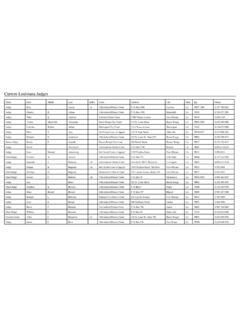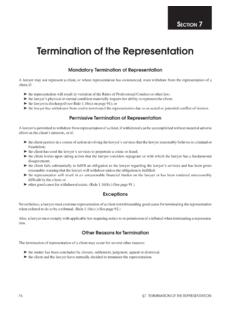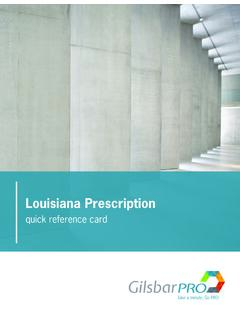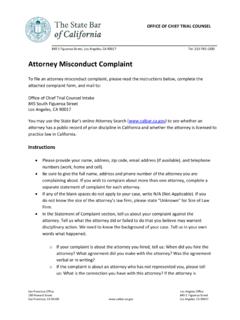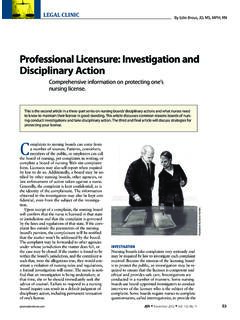Transcription of HOW TO RESPOND TO A DISCIPLINARY COMPLAINT AND …
1 1 HOW TO RESPOND TO A DISCIPLINARY COMPLAINT AND WHAT TO EXPECT FROM THE DISCIPLINARY PROCESS IN LOUISIANA I. INTRODUCTION You are particularly vulnerable to accusations of unethical conduct if you are a solo or small firm practitioner. As a solo you are more likely than not going to receive a COMPLAINT at some point in your career. Why? Most clients of solo practitioners are individuals, many of whom do not have a sophisticated understanding of the legal process. The practice areas of many solo practitioners involve criminal defense, family and personal injury. Generally, clients in these types of cases are particularly emotional about their legal problems and, thanks to lawyer television dramas; many have unrealistic expectations of what their lawyer can accomplish for them.
2 Should the client become unhappy, he is likely to contact the Office of DISCIPLINARY Counsel (hereinafter referred to as ODC ) because he feels there is no where else to turn. It is the perception of many that solo practitioners are targets of the DISCIPLINARY agency and that corporate or large firm lawyers are not subject to the same scrutiny. The discipline system itself tends to focus on the conduct of solo practitioners because it relies heavily on complaints as a 2source of information about ethical misconduct. Dissatisfied corporate clients are more likely to complain to a large firm s supervising partner, take their business to another firm or to court via a claim for malpractice. However, complaints against corporate and large firm lawyers filed with the ODC are more common today due to every lawyer s duty to report another lawyer s misconduct as set forth in Rule of the Rules of professional Conduct II.
3 HOW AND WHERE A COMPLAINT IS FILED Upon contact with the DISCIPLINARY agency, the complaining party ( complainant ) is told that his COMPLAINT must be made in writing. The complainant is provided with a form either by mail or by downloading the form from the website. The complainant is directed to complete the form and mail or deliver it to the Office of DISCIPLINARY Counsel. All complaints are received by the Office of DISCIPLINARY Counsel in Baton Rouge. The ODC is the investigative and prosecutorial arm of the Louisiana Attorney DISCIPLINARY Board. The Louisiana State Bar Association does not receive/handle DISCIPLINARY complaints and has not done so since before 1990. If you have never received a COMPLAINT , you should nevertheless, familiarize yourself with Louisiana Supreme Court Rule XIX, which sets forth the procedures and rules for lawyer DISCIPLINARY enforcement.
4 The full text of Rule XIX can be found in the Louisiana Rules of Court or on the website under the heading publications. The ODC may investigate any information coming to its attention; however, the most common source of complaints are dissatisfied clients. The ODC on a consistent basis receives approximately 3,200 complaints per year. A. The Screening Process 3 All complaints received by the ODC are first evaluated by the screening counsel who is a full time attorney employed by the ODC. The screening counsel evaluates the COMPLAINT for the purpose of determining whether or not the COMPLAINT should be opened for investigation. Approximately 1,000-1,200 complaints per year do not survive the screening process and are not opened for investigation.
5 The complainant will receive a letter stating why the COMPLAINT was not opened. If you are the subject of one of these complaints , you will not receive notice. Rule XIX does not provide for appellate review of screening decisions not to investigate a COMPLAINT . Approximately 400 complaints per year are referred by the ODC to the LSBA Practice Assistance Program. complaints of unintentional minor misconduct, fee disputes and return of file issues are often referred to the program. complaints alleging unprofessional behavior are often sent to this program as well, in an effort to resolve the problem between the lawyer and the complainant. Participation in the program is voluntary. If you are invited by the LSBA to participate and refuse participation, or if you participate and the problem is not resolved, the matter will be sent back to the ODC screening counsel for the purpose of determining whether or not the COMPLAINT at that point should be opened for investigation.
6 Approximately 1,500-1,600 complaints per year are opened for investigation. The COMPLAINT is not a charging document. The decision to open the file for investigation does not mean that the ODC believes a rule violation has occurred. In accordance with Rule XIX Section 11(D) the screening counsel with ODC must open a file for investigation when the facts alleged in the COMPLAINT , if true, may be a violation of the Rules of professional Conduct. When the screening decision is made to open the matter for investigation, the complainant will receive a letter from the ODC stating that the COMPLAINT was received and will 4be investigated. The investigative file is assigned to one of approximately twelve (12) DISCIPLINARY counsel who are employed as full time attorneys to investigate and if warranted prosecute any charges stemming from the investigation of the COMPLAINT .
7 B. Dreaded Certified Letter When the investigative file is assigned to a particular DISCIPLINARY counsel, in almost all cases, a certified letter is mailed to the respondent attorney enclosing a copy of the COMPLAINT . The certified letter from the ODC will request a written response to the allegations set forth in the COMPLAINT within fifteen (15) days of receipt of the letter. Routinely, the ODC will grant an additional fifteen (15) days in which to provide a response. The certified letter from the ODC will almost always arrive at a terrible time when you are preparing for a big trial, on vacation or during the Christmas holidays. The complainant will almost always be the client whom your gut told you in the beginning would be trouble, but you decided to represent out of the goodness of your heart.
8 The complainant will almost always be a client who owes you money and may include misrepresentations and half truths. Do Not Ignore the COMPLAINT : Failure to RESPOND is an invitation for the ODC to issue a subpoena for you to appear and provide a sworn statement under oath before a court reporter. Failure to RESPOND or cooperate with the ODC is in itself a violation of Rule (c) of the Rules of professional Conduct. Failure to RESPOND will not make the COMPLAINT go away. The ODC is obligated to investigate. Failure to RESPOND will frustrate the ODC s obligation to move the process forward and will set a poor tone for the investigation. Do Not Contact the Complainant about the COMPLAINT : Direct contact about the COMPLAINT with the complainant almost always results in disaster.
9 5 Negotiations with the complainant to drop the COMPLAINT are almost always reported to the ODC and may result in a separate rule violation. Even if the complainant notifies the ODC that he wishes to drop the COMPLAINT , it will not go away. The ODC is obligated to fully investigate with or without the ultimate cooperation of the complainant. Do not file a lawsuit against the complainant in response to the COMPLAINT . Rule XIX protects complainants and witnesses in the DISCIPLINARY process from retaliation in the form of civil suits. See Rule XIV, Section 12. Doing so constitutes a violation of the Rules of professional Conduct. See Rule (d). If the complainant is a current client, you may wish to withdraw from the representation.
10 If so, be mindful of your ethical obligations to properly terminate the representation pursuant to Rule (d). If you do not wish to withdraw from the representation (believing the COMPLAINT is a misunderstanding and will ultimately be resolved) you are not prohibited from contacting your client about the representation. CAVEAT: A decision to continue to represent a client who has filed a COMPLAINT against you should be made only after consulting with a lawyer who is an experienced Respondent s counsel. C. Should You Hire Counsel? If you have to ask yourself this question, then the answer is yes! A man who represents himself has a fool for a client and a fool for a lawyer. It is true that some lawyers handle their own responses to DISCIPLINARY complaints without a problem.


